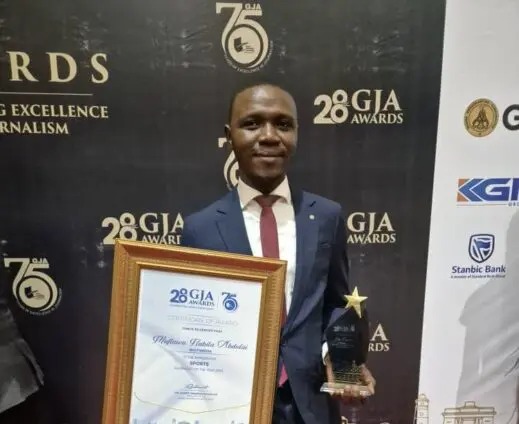It was a night filled with anticipation and recognition, as journalists from all over Ghana gathered at the Accra International Conference Centre for the 28th Ghana Journalists Association (GJA) Awards on Saturday, September 28, 2024.
Among the honourees, one name echoed loudly—Muftawu Nabila Abdulai, who was crowned the GJA Sports Journalist of the Year.
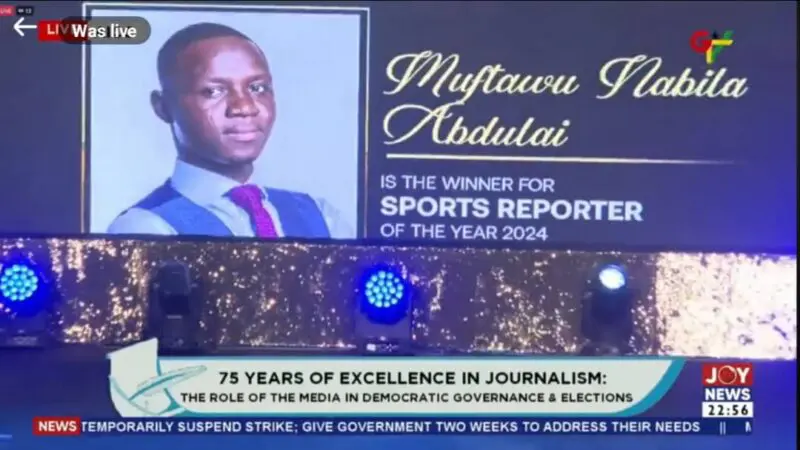
The GJA is the professional body that represents journalists in Ghana, and receiving an award from such an institution is no small feat.
Muftawu’s accolade was one of the night’s top highlights, marking a pinnacle in his career that has spanned over a decade.
As he took the stage to accept his medal and plaque, there was a sense of pride not only from him but from his colleagues and the entire sports journalism community.
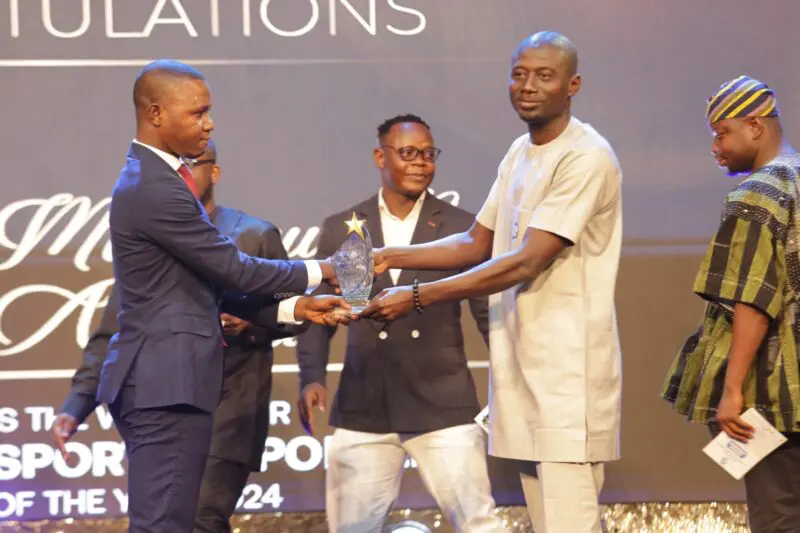
For the boy from Duu, however, this wasn’t just a personal achievement. It was a mantle of responsibility. “This is a responsibility,” he began with a smile that reflected the weight of the moment.
“It is a responsibility to uphold the highest standards of journalism, a responsibility to leave a legacy. I walked into the offices of the Multimedia Group about four years ago, and today, I stand here as Ghana’s Sports Journalist of the Year.”
Gratitude poured from his post-award interview as he thanked Kwasi Twum, the visionary man behind the Multimedia Group, for providing the platform that allowed his work to shine.
He also expressed deep appreciation to his colleagues at JoySports and across other departments within the group.
The early years: A pen in hand, a story to tell
Long before the spotlight of the GJA awards, Muftawu had quietly been honing his craft, steadily building a reputation as one of the most reliable voices in sports journalism.
His journey, like all great stories, had humble beginnings—starting not with a camera or microphone, but with a simple blog and a deep love for writing.
During his days at Wulugu Ranch JSS and later Lartebiokorshie ‘3’ JSS, Muftawu’s passion for storytelling was evident.
He would eagerly write letters and articles for his teachers, asking them to mark and critique his work. “I’ve always had a love for writing,” he recalls fondly. “Even in school, I would spend my time crafting stories, hoping to get better.”
At Bawku Secondary School, Muftawu’s love affair with the written word blossomed even further. He would devour every newspaper he could find in the library, even if they arrived days late. His hunger for knowledge and his desire to stay informed were insatiable. “I would describe myself as one of those disappointed footballers who found a way of staying in the game,” he laughs.
Like many young boys, he had dreams of becoming a footballer. He played the game passionately—even when illness tried to keep him off the pitch.
“I remember one time, my primary school teacher, Mr Iddi, had to pull me off the school team because I was too sick to play. But as soon as I recovered, I made the team again and was named one of the top six talents during inter-school tournament.”
Football may not have been his destiny, but Muftawu’s love for the sport never wavered. Even when he moved to Accra to join his mother, he immersed himself in football, albeit from a different perspective.
“Back in the village, we only had a small black-and-white TV. It was maybe a 5-inch screen, but I’d sit glued to it, watching every match.
When I got to secondary school, like any other science student, we were told our subjects were difficult so the focus was on my books.
“However, when I was in my second year, I became a referee and the house coach. I even debated for my school and never lost a match!”
The road to journalism: A path paved with perseverance
Unbeknownst to him, Muftawu was laying the groundwork for a career in media. His constant reading and writing kept him sharp, but not without its challenges.
He recalled a particularly disheartening incident in school when a teacher, Mr Miilu Maurice, punished him for an article he’d written.
The content of the article—a story about a wicked woman mistreating her niece—angered the teacher, who locked him in his office and confiscated his work.
“Mr Maurice almost killed my writing dream,” Muftawu admitted. “But somehow, I found my way back to it. I even had three articles published in the school’s first-ever magazine.”
After secondary school, life took Muftawu on an unexpected journey. He worked as a garden boy at Gulf House and later moved to the Airport VVIP lounge as he worked to raise money to further his education, all while feeding his passion for reading and storytelling.
When he was on this, practising media was never a part of his books because he wanted to be a teacher.
However, he enrolled at Rabodef, a radio school run by veteran broadcaster, Tommy Annan-Forson and Nana Yaa Agyare to learn how to read and write better.
When opportunities for internships at Metro TV, Radio Gold, and Viasat 1 TV didn’t pan out after graduating from Rabodef, he decided to create a blog—a move that would change the trajectory of his career.
“I started writing again, even though my early articles were a bit amateurish,” he said with a grin.
But persistence paid off.

Muftawu called into sports shows, contributing his thoughts on football, until one day, a friend named Jeffrey invited him to appear as a guest on a weekend sports show at the now-defunct Choice FM. That marked his first on-air experience, and from then on, he became a regular guest.
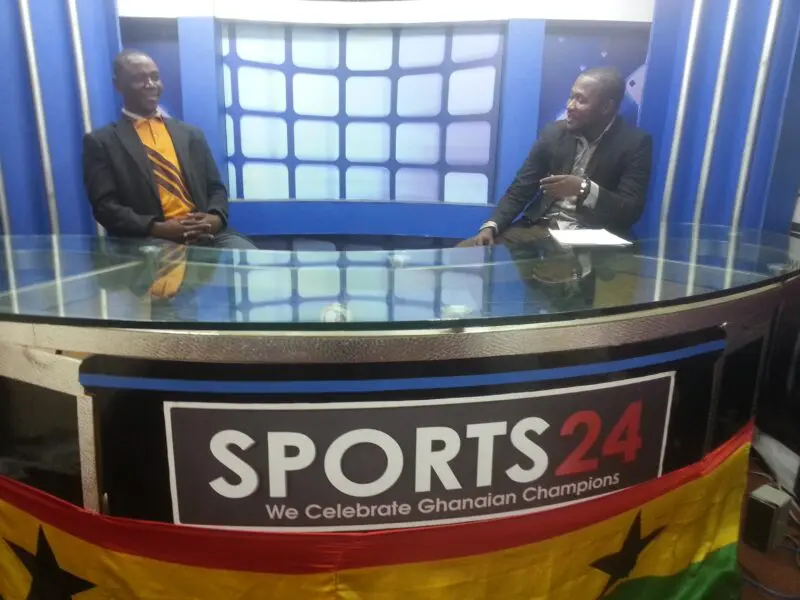
He had transitioned to Sports 24 and began contributing to goal.com Ghana through Kent Mensah. It was the turning point for this young man born in Duu and groomed in Nabari in the North East Region.
Muftawu had fun writing features and opinionated articles and he wrote many for goal.com before and during the 2014 FIFA World Cup Brazil, which allowed him to network with key figures and further establish his credibility.
All these were pastimes as he wrote for free.
The breakthrough: A career takes shape
A chance meeting with Godfred Akoto Boafo at a Ghana Football Association press conference in 2014 would prove to be another pivotal moment. A few weeks later, Mr Akoto Boafo who had seen his works on goal.com offered him an opportunity at allsports.com.gh, now pulse.com.gh/sports.
It was a call that handed him his first media-paying job and he did it passionately. He toured Ghana Premier League centres and athletics events, especially the Ghana Athletics circuit championships, and wrote many stories. His journey began to take proper shape as he deliberately covered these events and wrote reports on them.
He was assigned many tasks during AFCON 2015 in Equatorial Guinea and even after the tournament. Noticing his love for athletics and feature writing, Godfred assigned often him to these events or ask him to watch matches and write articles titled, “Five things we learnt from Ghana’s loss or win, or draw, etc.”
“I remember exchanging WhatsApp messages with Mr Nyantakyi to ensure that my reporting was fair and accurate,” he reflected.
He wrote an article in June 2015 titled, “How Stephen Appiah redefined the Black Stars,” same year when the former Black Stars captain was preparing for his testimonial match.
In July same year, he wrote two articles on Sellas Tetteh and Asamoah Gyan. Ghana U20 had lost to Mali in the 2015 U-20 World Cup and Tetteh, the only African coach with a FIFA U-20 World Cup gold medal suddenly became a villain.
Muftawu disagreed. The one he wrote on Gyan was after his big-money move to China that made him the eighth-highest player in the world. Gyan had experienced lots of tribulations and that success meant “Asamoah Gyan – a testimony of survivor.”
In August, he wrote the most controversial article on Kwesi Nyantakyi, “If Kwesi Nyantakyi is corrupt as we are made to believe, why is he the favourite for the FA presidency again?” it dominated conversations leading up to the FA elections in Tamale.
In November and December, he was at it again, describing Rabiu Mohammed and Majeed Waris as privileged Black Stars fans after Ghana’s win over Comoros in a 2018 World Cup qualifier, before accusing the GFA stabbing GN Bank and Division One League after its officials did not show up for DOL 2015 Awards night.
Then Executive Council member Lawyer Kweku Eyiah later arrived to represent the FA. Muftawu’s profile began to take shape and Primeval Media, led by Lawrence Opare Otoo tapped into it to help it grow, but it didn’t take long before Viasat 1 TV, a channel he had tried to intern with came calling to give him a job. Muftawu crossed the carpet to the now-defunct Viasat 1 TV, which became his first major media employment.
It was a chance taken on him by then-editor, Linda Sarfoa Antwi, who later said, “I would do it over and over again.”
Muftawu Nabila Abdulai’s rise in the world of sports journalism is a story of resilience, adaptability, and the power of local content.
From the moment he launched his YouTube channel, his consistency in covering local events and press conferences made him a go-to source for his colleagues. It wasn’t long before his name became synonymous with comprehensive coverage and inside scoops.
On his very first day at Viasat 1 TV, Muftawu was shown how to edit a story just once. Though he started out slow, he quickly became proficient, learning to edit his pieces for the news. By the time the company transitioned to Kwese TV, Muftawu had mastered editing so well that he could handle footage from three different cameras.
Walking in with zero editing experience, he left as a near-expert in Adobe Premiere.
Throughout his time at Viasat, he continued writing for allsports.com.gh, later known as pulse.com.gh, penning numerous articles on standout players from the Ghana Premier League like Latif Blessing and Akwesi Donsu.
His writings didn’t just highlight players’ talent but also delved into the systemic issues within Ghanaian football.
His article on how the Division One League was a ‘death trap’ for players due to hooliganism led to significant action from the Ghana Football Association (GFA), proving just how impactful his work had become.
As his career progressed, he built an impressive network within the Ghana Premier League, especially with clubs like Asante Kotoko and Hearts of Oak. His sources were so reliable that every story he broke came true. His influence was so strong that rumours circulated he had a hand in hiring Portuguese trainer, Sergio Traguil, for Hearts of Oak.
Muftawu’s connections didn’t stop there. He became the first to break the news that SuperSport was ending its partnership with the GFA, with StarTimes set to replace them.
It was months before the news became official, but his scoop proved accurate once again.
One of his most explosive stories came when he uncovered FIFA’s sanctions against GFA officials Isaac Addo and Nana Banyin Eyison following allegations of impropriety at the FIFA Women’s U-20 World Cup in Papua New Guinea.
Despite the GFA’s silence, he reached out directly to FIFA’s Ethics Committee, receiving confirmation that the duo had indeed been sanctioned, though the details were protected by FIFA’s Code of Ethics. This revelation cemented his reputation as a journalist who could uncover what others couldn’t.
His coverage extended beyond local stories. Ahead of Ghana’s 2017 AFCON qualifier against Rwanda, Muftawu reported on the tense relationship between the GFA and the Sports Ministry, including how FA officials had to buy their own tickets to watch the match.
At a press conference for the 2017 AFCON squad announcement, Muftawu asked Avram Grant why no local outfield players had been selected for the national team. Grant’s response was a measured defence of his decision, while FA President Kwesi Nyantakyi backed the coach by emphasising that player selection was based on merit, not location.
Despite their answers, the media remained dissatisfied, and Muftawu’s question became the headline of the day.
His journey is a testament to the power of persistence, curiosity, and the ability to build trusted networks. From his early days as a self-taught editor to breaking major stories in Ghanaian football, he has carved out a respected place in sports journalism, both locally and internationally.
His journey has been nothing short of remarkable. A testament to his versatility, he covered the 2016 presidential and parliamentary elections for Viasat 1 TV, where he had the rare privilege of interviewing former President John Agyekum Kufuor.
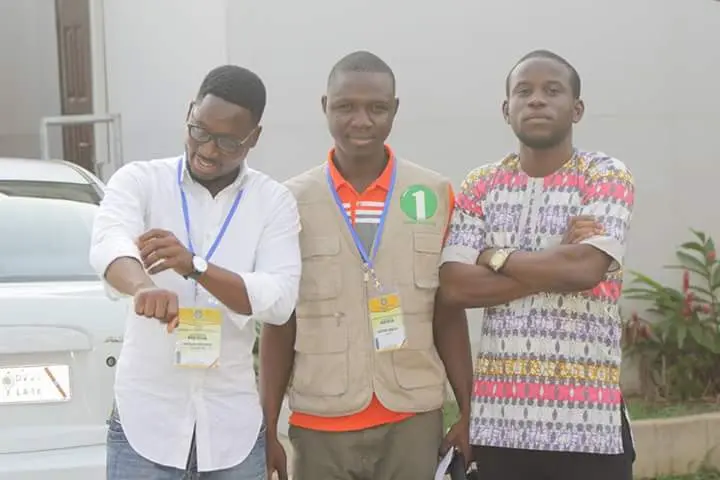
During the elections, Muftawu reported from the Ayawaso East and Wuogon constituencies, visiting polling stations and collation centres, before being stationed at the NDC headquarters.
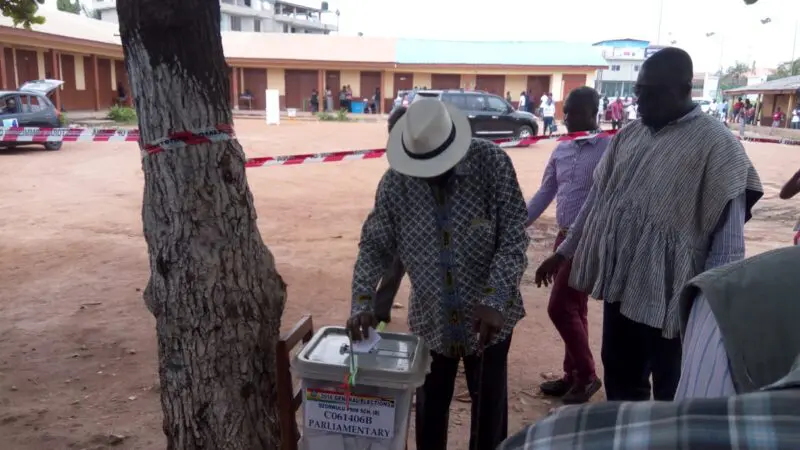
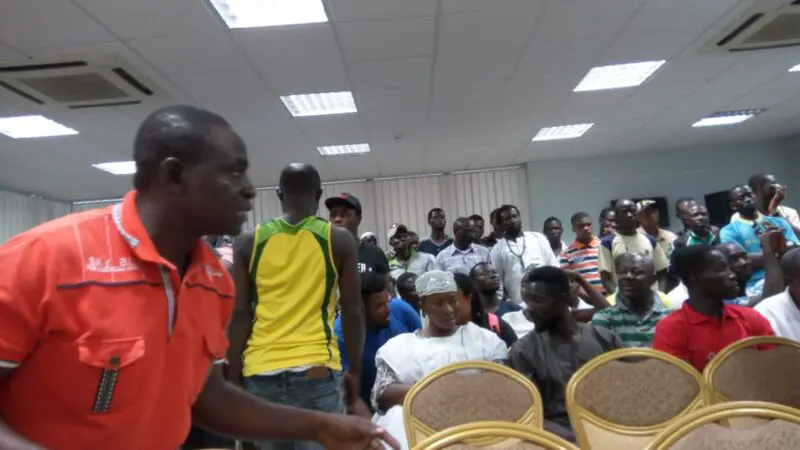
A few weeks after the elections, FIFA President Gianni Infantino visited Ghana. It was Muftawu’s bold question to Infantino about FIFA’s financial support to its member associations that sparked a national conversation.
Until then, few Ghanaians knew the actual figures FIFA disbursed to the GFA, but Muftawu’s inquiry brought transparency, with discussions about how the GFA was using the funds dominating the airwaves for weeks.
His knack for breaking significant stories continued post-AFCON 2017 when he led coverage on the dissolution of the Black Stars and the impending return of Kwasi Appiah as coach. His reporting was so precise that he detailed Appiah’s contract negotiations, held in Addis Ababa, and even revealed his salary package.
“It’s difficult to pick just one story,” Muftawu reflects. “I would choose two: the return of Kwasi Appiah and Kwesi Nyantakyi’s nomination as CAF’s First Vice President.”
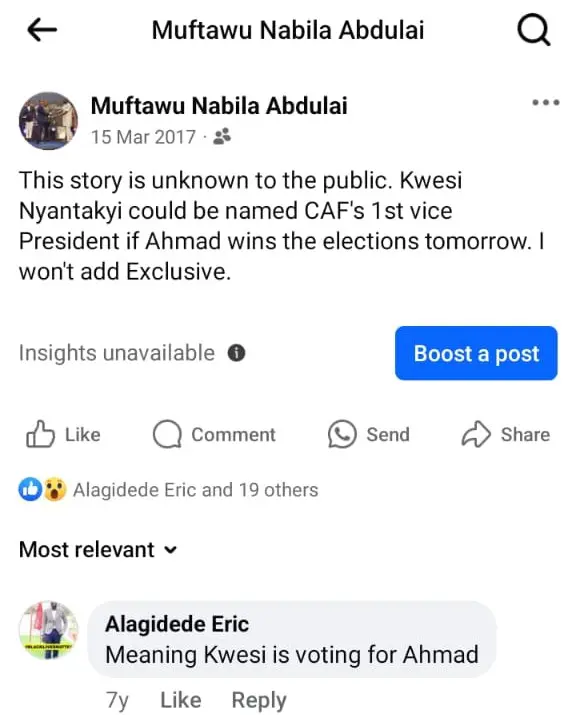
His work was often doubted by senior colleagues, but his persistence and accuracy silenced critics when both stories were confirmed, with Nyantakyi’s role being validated months later.
As Viasat 1 TV transitioned into Kwesé Free Sports (KFS), Muftawu remained one of the few retained staff members during the restructuring.
He went on to uncover headline-making stories, including his revelation of how the National Sports Authority received over $2 million from AngloGold Ashanti for sporting infrastructure, which could not be traced. This exposé had him featured on several TV programmes, solidifying his growing reputation.
His ability to obtain exclusive interviews further elevated his status. In 2017, he interviewed Tony Weeks, the world-renowned boxing referee, and then FIFPro General Secretary, Theo Van Seggelen. He also revealed crucial details about Ghana’s Football Association’s agreement with StarTimes, a deal that remained largely under wraps until his reporting.
His coverage of the infamous “Number 12” documentary by Tiger Eye PI in 2018 placed him at the forefront of Ghanaian journalism. A month before the exposé’s premiere, Muftawu published details that illuminated the scheme, revealing the companies and individuals involved in the trap that ultimately ensnared Kwesi Nyantakyi.
This earned him the moniker “FillaMan,” due to his stories being 99.9% accurate.
The 33-year-old became a go-to source of information regarding the GFA’s Normalisation Committee, frequently writing to FIFA and reporting every major move the Committee made.
His detailed coverage of Zylofon Cash’s deal with the GFA also showcased his relentless pursuit of the truth, despite pushback from fellow journalists.

His dedication to his craft didn’t go unnoticed. Muftawu was the first to report on the GFA’s financial dealings and his exclusive interviews with global football figures such as CAF President Ahmad Ahmad and former Black Stars icon Anthony Baffoe further cemented his authority in the sports industry.
In 2018, USA-based media organisation, ESPN recognised his talent, as he produced content from world champions like Isaac Dogboe, Robert Pires, and Thomas Partey. His reporting extended beyond Ghana, with his contributions to FIFA agencies and his coverage of the 2018 Women’s AFCON for Gracenote, a Dutch-based agency.
In 2019, his publication on the Normalisation Committee’s plans to disqualify Wilfred Kwaku Osei ‘Palmer’ from the FA elections was used as an Exhibit at the Court of Arbitration for Sports (CAS). The reasons he reported in July were used in October same year to disqualify the candidate.

His coverage of the GFA was so good that he categorically called the GFA election results three days before the polls and missed by just a fraction of the vote.
“I think if I waited till the morning of the elections, I would have gotten it right,” he says.
“I knew where many of the delegates were going to vote. I knew the camps. That 2019 elections, I gave it my all,” he said.
An article he wrote in the build-up to the Congress was ranked second in the AIPS awards in 2019. He also interviewed candidates in his show called GFA Decides.
His unwavering integrity often put him at odds with those who hoped to manipulate his reporting for personal gain. Despite this, he remained steadfast, publishing stories that held individuals accountable, including shady dealings within the GFA.
Muftawu had become such an authority in the sports industry. Posts on his social media handles became the news for websites.
“It was a great year for me,” he says. “I won’t say it was my best year because in journalism, you’re as good as your last story so every story I do, it has to be better than the previous year so all my stories have made the headlines.”
He broke the story of how Nigeria’s telecommunications company, a former sponsor of the Black Stars and Ghana league paid $1m outstanding debt owed the GFA cash to then leader of Normalisation Committee, Dr Kofi Amoah, and his decision to pay 10% of the money to lawyer Frank Davis.
The 10% was later returned to the GFA when he published details that said Thadeous Sory worked for the money and not Mr Davis.
Simply put, Muftawu saved the GFA about $100,000.
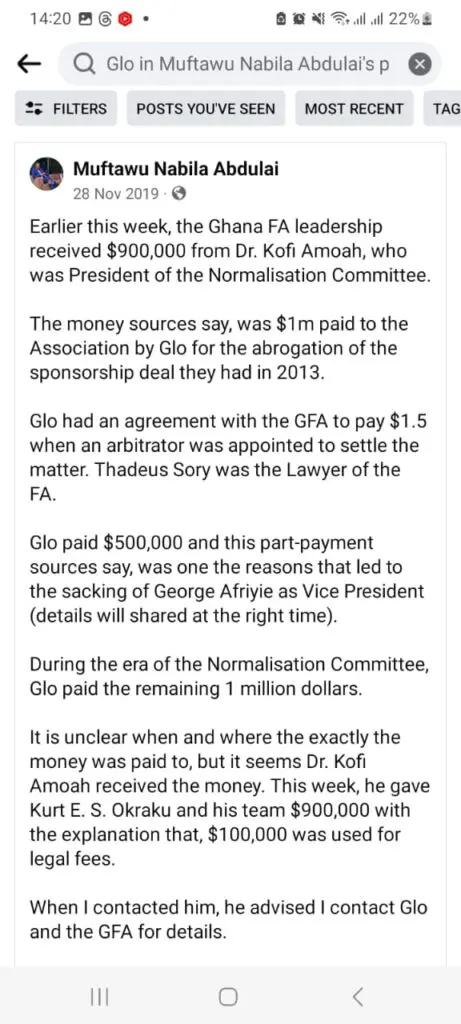
He revealed how then NSA Director General, Prof Peter Twumasi lost his car in Kumasi and investigated the story. Though inconclusive, he said the car was not stolen and said only investigative bodies with constitutional backing could find the car because every evidence he gathered showed that evidence he adduced showed that the car was not insured despite claims by the director that it was insured.
The insurance could not be traced. He also said armed robbers attacked his driver and took the car, but Muftawu said that was false.
He would later report double salary which was being paid to the NSA Director, and many more.
Muftawu was accused of being the reason Prof Twumasi was sacked by President Akufo-Addo in 2024. His pen exposed all fraudulent activities he was alleged to have engaged in. But as a journalist, he always gave him the right to reply before publishing.

Back to his versatility, he hosted current affairs show on Kwesè called The Feed and had guests from business, political, and civil society organisations on it. His dexterity is one of a kind.
On December 24, 2019, Muftawu hosted his last show on Kwesè Free Sports. He broke the story of CK Akonnor’s appointment as Black Stars coach and later added his salary.


By 2020, Muftawu’s transition to the Multimedia Group was marked by a flurry of high-impact stories. He reported the turbulent relationship between GFA President Kurt Okraku and Black Stars coach CK Akonnor, which eventually led to Akonnor’s sacking. Kurt dictatated player call-ups.
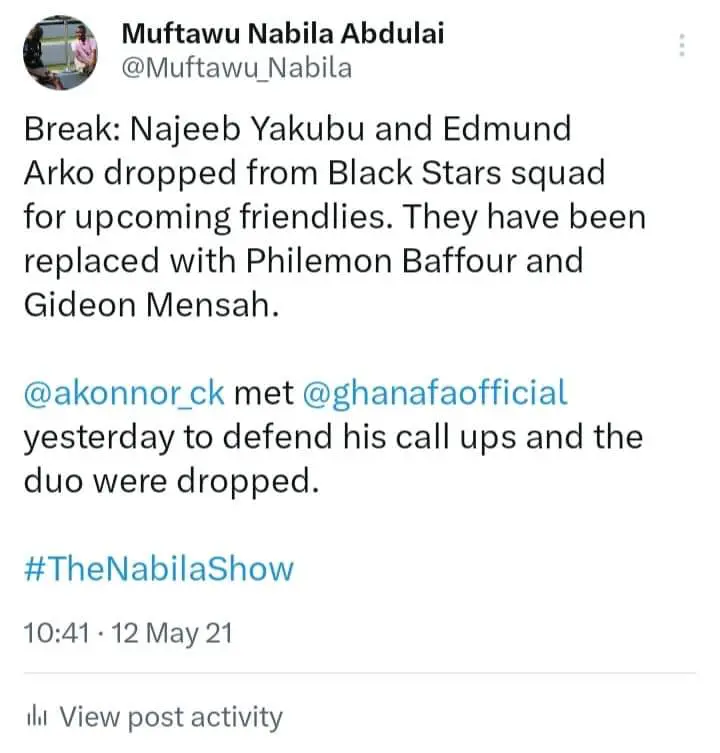
Despite being physically in Accra during the 2021 Africa Cup of Nations (AFCON) in Cameroon, Muftawu’s well-placed sources kept him in the loop. His reports were ahead of the curve, delivering team news before kick-off. His coverage was so comprehensive that he hosted a dedicated show called Inside Cameroon, keeping fans updated throughout the competition.
That same year, his outstanding work earned him among the top 10 at the prestigious AIPS (International Sports Press Association) Awards for a documentary on an 11-year-old female boxer from Jamestown, a suburb of Accra. The documentary showcased Muftawu’s knack for human interest stories, further solidifying his status in the world of sports journalism.
Muftawu’s dominance didn’t stop there. He broke the story of Milovan Rajevac’s sacking and boldly declared the day it would be officially announced—something that came to pass.
When the debate over the next Black Stars coach heated up, Muftawu reported that Chris Hughton, despite political backing, was not the Ghana FA’s preferred candidate, which was Otto Addo.
His reports, always factual and eye-catching, made him the go-to source for credible sports news. When a compromise was reached between Hughton and Addo, Muftawu had it covered.
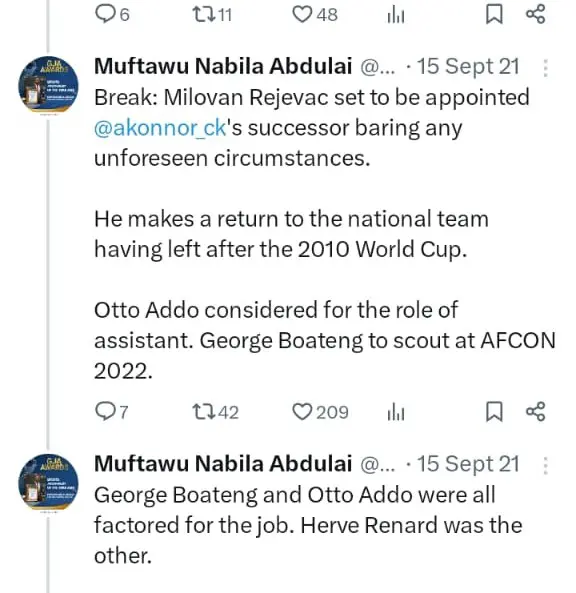
He also reported on Ghana’s 2022 World Cup qualifier against Nigeria from Abuja, publishing two of the most-read articles on the match.
In 2022, Muftawu was selected by World Athletics for a media development programme in Nairobi, Kenya—he was the only Ghanaian journalist chosen for this honour.
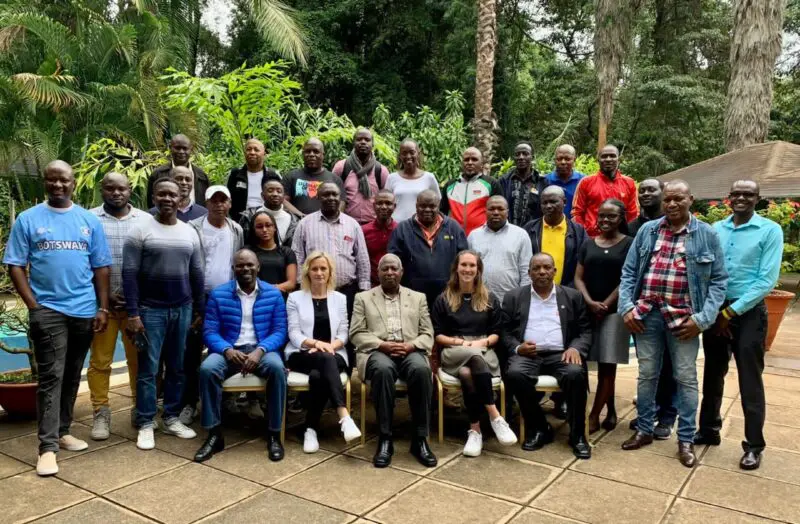
Muftawu’s fearless reporting often put him at odds with football’s governing bodies. When the Ghana FA sanctioned AshantiGold and Inter Allies for alleged match-fixing, he was a dissenting voice. With in-depth knowledge of the inner workings behind the scenes, he exposed the cracks within the FA’s handling of the case.
In July 2022, the Duu boy was in the USA to cover the World Athletics Championships in Eugene, where he interviewed high-profile figures like World Athletics President Sebastien Coe, sprinting legend Shelly-Ann Fraser-Pryce, and track stars Noah Lyles and Christian Coleman.
His time in the USA also saw him breaking the news that the Court of Arbitration for Sport (CAS) had overturned the Ghana FA’s ban on players accused of match-fixing after FIFPRO took the case to CAS.
With his journalistic instinct, he wrote to both FIFPRO and CAS for official statements, ensuring his reports were accurate and comprehensive.
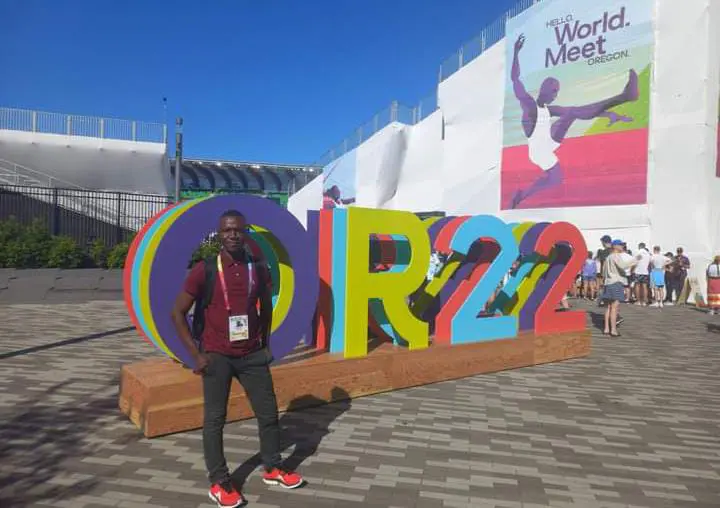
Upon returning to Ghana, he produced World Cup 2022 content for the FIFA+ channel, serving as Ghana’s correspondent.
But before that, he broke the story of Inaki Williams’s nationality switch to Ghana.
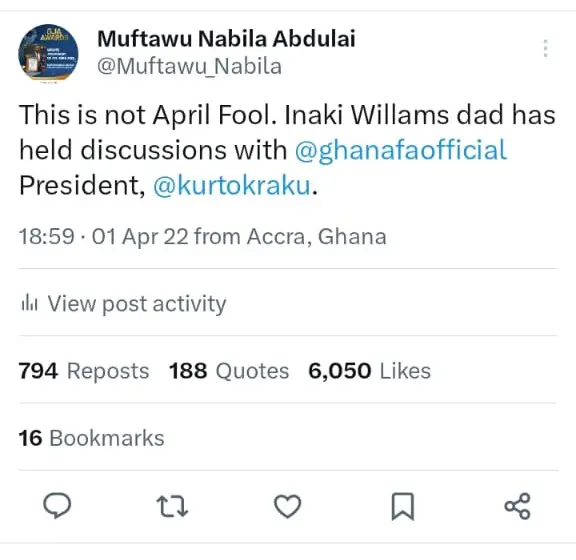
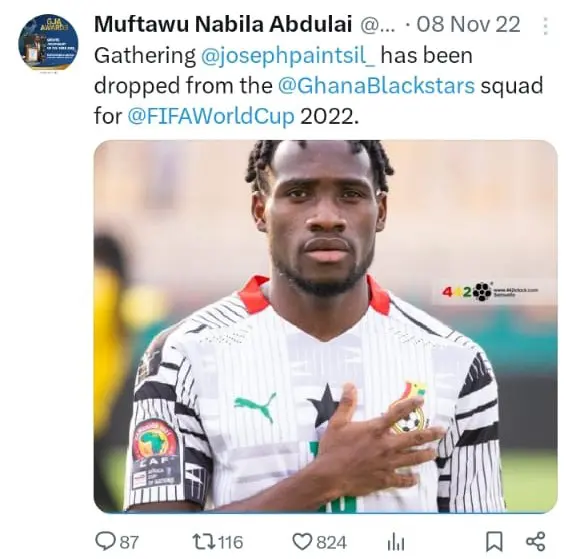
His precision in breaking Ghana’s World Cup squad stories and his coverage of the tournament left an indelible mark.
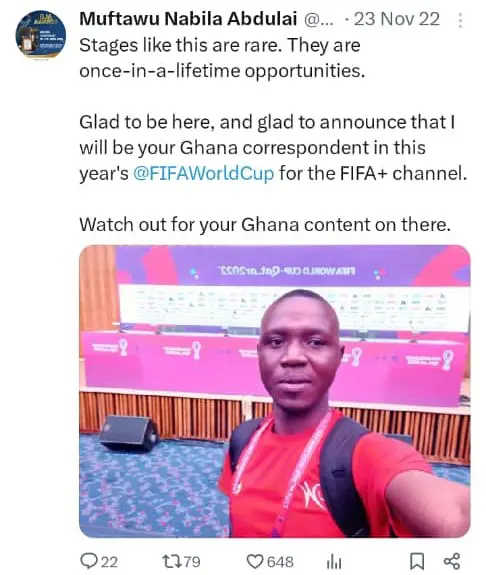
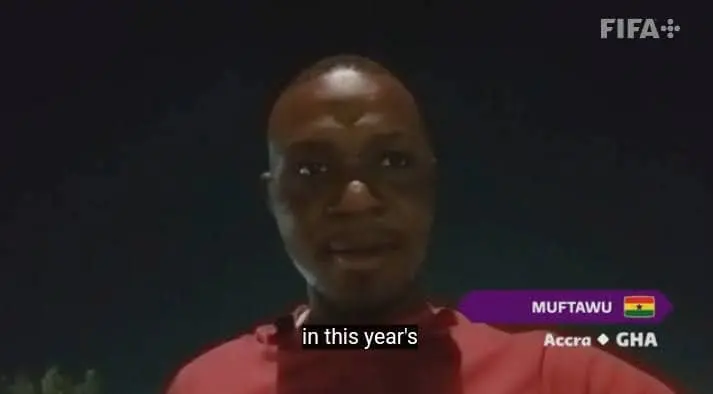
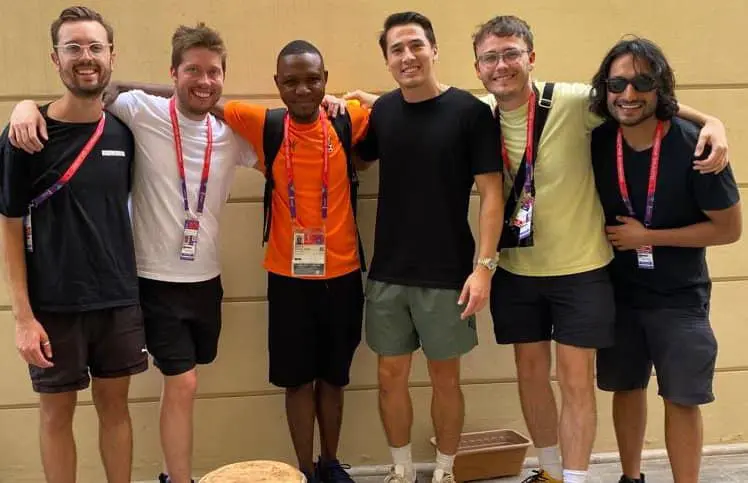
By the end of 2023, his story on Ghana’s World Cup prize money was named the most impactful story of the year, though it put his life at risk, requiring intervention from Reporters Without Borders and the Ghana Police.
He took a short break, but returned in 2024, to break major stories as well as cover the African Cup of Nations in Cote d’Ivoire and the African Games in Accra. His coverage of both tournaments was excellent.
Muftawu has been that journalist who goes beyond and he showed that this year when raised funds to buy furniture for deprived schools in his home region, demonstrating his commitment to social impact.
Recently, his publication of FIFA’s financial support to the Ghana FA for the maintenance of natural grass pitches was topical. For nine consecutive years, Muftawu has created content that dictates the narratives. These examples are just but a few.
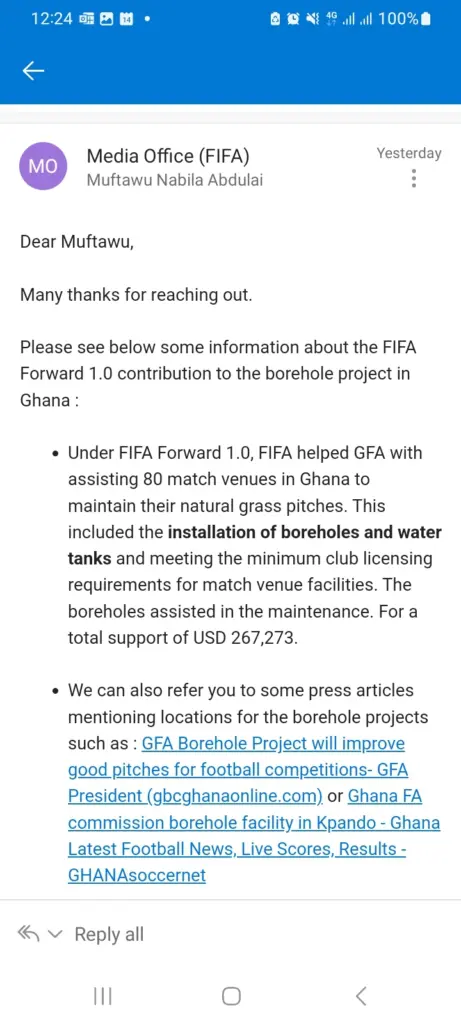
On September 28, 2024, after years of dedication, he was adjudged the Sports Journalist of the Year by the Ghana Journalist Association. Reflecting on his achievement, he humbly stated, “I didn’t see this coming. I do my work with zero expectations apart from my salary,” he laughed.
His journey, marked by his relentless pursuit of the truth and his dedication to accuracy, has cemented him as a trusted voice in Ghanaian sports journalism.
A legacy in the making
Today, as the GJA Sports Journalist of the Year, Muftawu Nabila Abdulai is not just a journalist but a beacon for aspiring writers. His journey from the small village, of Duu, in Northern Ghana to the biggest stage in sports journalism is a testament to resilience, passion, and an unwavering belief in the power of storytelling.
“I never set out to win awards,” he said humbly. “I just wanted to tell stories, to write, to make an impact. But here I am, and I’m grateful.”
“I will continue to do my bit, I will continue to engage in stuff that benefits the needy, especially my school furniture project. And lest I forget, my baby, Prime Take is about two years old now and I have had over 60 guests on it. Hopefully, it gets better and I will continue to give it my best shot.”
And so, the story of Muftawu Nabila Abdulai continues—one chapter at a time.
ALSO READ:

